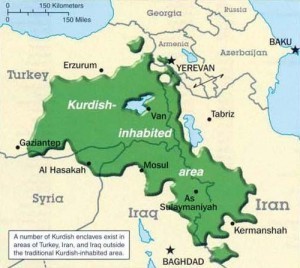C. Aaron Russell's Blog, page 3
September 1, 2014
A call to prayer and support for the Kurds: Middle Eastern allies against ISIS (News Video)
August 29, 2014
Witnessing to the Enemy – Confronting Islam in America
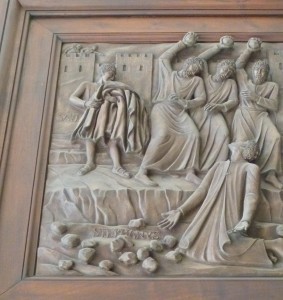
Door Panel at St. Paul’s Basilica in Rome.
Selection from new book, Lessons In Faith—learned the hard way, by C. Aaron Russell. Labor Day Weekend Promotion – Free Kindle Ebook Sat-Mon
Father’s Day Weekend, June 2012—Arab International Festival, Dearborn, MI—A group of Christian demonstrators was attacked by an angry mob (formed from the largely Muslim crowd in attendance) hurling stones, bottles and debris. The assault was captured on video. The police made virtually no attempt to prevent or stop the violence or protect the demonstrators. No arrests were made. Though the Christians had a permit to demonstrate and remained peaceful, they were forced by the police to leave under threat of citation and possible arrest. It was also surprising how little attention such a shocking incident was given by the national news media, although the video capturing much of the violent confrontation went viral on the Internet.
As an American, it is difficult to watch the video, to see the angry faces and hear the threats that the mob shouted at the Christian demonstrators, without being filled with anger. America is a country founded on freedom—freedom of religion, the right to free speech and the right to have a peaceful demonstration. It is hard to understand what our country has become, when a violent mob has more rights and police protection than peaceful demonstrators. The city of Dearborn, Michigan, and the Wayne County Sheriff’s Department acted as a disgrace to this country by not protecting the civil rights of its citizens.
However, being a Christian, more important than our sense of patriotism, is our loyalty to the Father in Heaven. Therefore, we must consider this from a higher perspective than an American one. It is natural, as we consider such a display of anger and hatred, for our flesh to tell us to fight back. The image of the Apostle Paul, being stoned in the city of Lystra for preaching the Gospel, comes to mind. Our emotions may tell us these people (Muslims) and their wayward religion that is becoming more and more corrupted by violence and extremism, are a danger and must be contained. But before we act, we must pray and seek God’s wisdom, and allow our spirit to be calmed. God does not see things like we do.
I searched for more details regarding this incident in Michigan, in an attempt to get a better understanding of how this could happen. As a Christian, I have to say I cannot agree with all the tactics used in this case by the Christian group of demonstrators, who call themselves the Bible Believers. The group was justified in going to such a place to witness. We are to go to the lost and spread the Good News of the salvation of Jesus Christ, but not to voice our hatred of another religion. The problem is, their intentions were more like those of protestors of Islam, than as witnesses for Christianity, as they claimed.
Instead of sharing the Gospel, with the Bible and Scripture, they displayed signs with incendiary slogans such as, “Mohammed was a Pedophile” and “Proud to be an infidel.” In addition, they carried a pig’s head and blood in an ice chest, an obvious offensive display intended to inflame and ridicule Muslims who view swine as an unclean animal. Just as with the Quran-burning demonstrations of Pastor Terry Jones and his church, the Dove World Outreach Center, these high-profile exhibitions appear to be more of a spectacle, in order to bring attention to themselves and spreading their anger, than a sincere effort to expand God’s Kingdom and give Him glory.
To be clear, this is not an attempt to apologize for the mob in this volatile situation, which were criminal in their actions and did not have sufficient provocation to become riotous. It only further demonstrates there is a growing faction of Islamists (and their sympathizers) with a proclivity to act out in violence. The Christian demonstrators certainly had a right to be there. They were within their American rights to demonstrate and did not resort to physical violence at any moment during the demonstration. And, even as victims in the face of attack, while being bloodied as they were pelted by rocks and debris, they did not retaliate, and should be credited for that part on their self-control.
That being said, we are to be messengers of God’s Word, in love and faith, not in anger. The Bible Believers are most likely devout Christians who truly love the Lord, but they are misguided and overzealous, and made poor witnesses of the Gospel in this instance. As believers, with the Holy Spirit in us, we are to speak to the heart of the sinner, not the sin itself. As sinners all, it is not our place to point fingers at other sinners, and rebuke or judge them, even if it is our perceived enemy. As they seek the truth and come with an open heart, God will deal with them on their false idols and sin, just as He does with all believers. Also, we should not fear those who hate us and would come against us as servants of Christ, for Isaiah told us in prophecy that had meaning for both the believers of his day and those living in the Day of the Lord yet to come (Christ’s Return),
“In righteousness you shall be established; You shall be far from oppression, for you shall not fear; And from terror, for it shall not come near you. Indeed they shall surely assemble, but not because of Me. Whoever assembles against you shall fall for your sake” (Is. 54:14-15 NKJV).
Neither should we become angry, nor return violence with violence. Jesus, who never followed Man’s natural instinct and always spoke rightly for God, said:
“You have heard that it was said, ‘An eye for an eye and a tooth for a tooth.’ But I tell you not to resist an evil person. But whoever slaps you on your right cheek, turn the other to him also. If anyone wants to sue you and take away your tunic, let him have your cloak also. And whoever compels you to go one mile, go with him two. Give to him who asks you, and from him who wants to borrow from you do not turn away. “You have heard that it was said, ‘You shall love your neighbor and hate your enemy.’ But I say to you, love your enemies, bless those who curse you, do good to those who hate you, and pray for those who spitefully use you and persecute you, that you may be sons of your Father in heaven…” (Matt. 5:38-45 NKJV).
Amen. When it comes to witnessing to the non-believer, be it to someone of another religion or no belief in God at all, and regardless of whatever sin or situation it is that may be holding them back—all they need, all any of us need, is Jesus.
Selection from new book, Lessons In Faith—learned the hard way, by C. Aaron Russell. Labor Day Weekend Promotion – Free Kindle Ebook Sat-Mon
August 15, 2014
Do churches practice what they preach about the tithe?
 Selection from Lessons In Faith—learned the hard way, by C. Aaron Russell, offering Free Ebook Weekend promotion, Sat. Aug. 16 – Sun. Aug. 17.
Selection from Lessons In Faith—learned the hard way, by C. Aaron Russell, offering Free Ebook Weekend promotion, Sat. Aug. 16 – Sun. Aug. 17.
Jesus said, “Blessed are the merciful.” The Good News is, even though we Christians are all sinners, God is full of grace and He forgives. In fact, the Bible says He will have mercy and abundantly pardon. The point is, though we should not take advantage of His grace, we can rest knowing that our sin debt was paid on the cross. That being said, we want mercy from God, but do we reflect that by showing mercy to others? Let’s use an example. We’re driving sixty-five mph in a fifty-five mph zone. Someone flies by driving eighty and we think, “What a maniac. Where are the cops when you need one so they can nail that guy and take away his license?” Truth be told, we judge others much more harshly than ourselves.
We’re all glad God has shown us mercy, but we are slow to give it and quick to judge others. Such as, we see an alcoholic or drug addict that can’t get cleaned up and say, “They don’t want to stop or they’re just too weak to quit.” Of the homeless we think, “Get a job.” We don’t like welfare because, “that single mom only has all those kids to get the government’s checks.” The point being made is not to advocate government assistance for those who are able to work. Rather, it is to demonstrate how we sometimes label people and lump them into a certain group or pattern of behavior without knowing the heart of the person. That’s prejudice and we’ve all done it. Only God knows the true heart of a person. The rest of us only like to assume we do. But our place is not to judge, only to give mercy. For those that do, Jesus says in the second half of the beatitude, “shall obtain mercy.” And let’s face it—we all need mercy in one way or another.
But how much do we really empathize with those who may be in need or are suffering? We may feel compassion but are we really doing anything about it? Or do most of us just assume our government and churches are taking care of them, yet rarely, if ever, get personally involved ourselves? Many believe we already give those in need too much with handouts, welfare and government programs. Many Christians question whether or not it’s the government’s place at all to care for the helpless and poor, believing that is the responsibility of the church, and trusting it more. So the vast majority of Christians reserve most or all of their giving for the church. Or do they?
In reality, giving today is at its lowest level since the Great Depression era. Only 5% of Americans pay any tithe at all to the church. Of those that do tithe, a 2011 report on the state of church giving showed that church members tithe an average of 2.3% of their income. Only 4% of Americans that attend church give the traditional 10% tithe. That same report found that the amount given by the church to benevolences outside of the church (purposes other than the local institutional church needs, such as missions) was 0.34%—that’s 1/3 of a penny of each dollar of income for giving to those in need. So, the average churchgoer isn’t giving much to the needy or to their church. The modern church has in large part forgotten the lost, hungry, and poor.
Most Christians give only to the church, which uses most of the tithe and offerings these days on church expenses, salaries, building expansions, production equipment, sports complexes, and so on. Any good church will give something back to the needy or missions, but it is seldom what it should be. Or the church itself, instead of giving from its own tithes and offerings received will make additional requests (asking for multiple offerings) from the congregation, above the tithe and offerings that have already been taken. We hear sermons often on what the congregation should be tithing and giving, but how often do we hear a message on how much the church institution should be tithing and giving to those in need?
So is each church itself (or church organization) supposed to tithe? In Numbers 18:26–28, the Lord, speaking to the priests through Moses, instructed them to give a tithe from the tithe they collect (not just a portion from each priest’s or minister’s salary). This was known as the Heave Offering. In addition, Deuteronomy 14:28–29 clearly states instructions to take the full tithe from all the land every third year (known as the Year of the Third Tithe) and divide it equally among the priests, the widows, orphans and sojourners. Could it even be fathomable, for the modern, corporate, business-model church, to take the full annual tithe received from its congregation every third year, and give almost all of it away to the poor? If you average it out, that would mean nearly one-third of all the funds received by a church should be given back to those less fortunate. In other words, almost one third of the church’s budget should be for missions and mercy projects.
“Well that’s Old Testament,” someone could argue. However, we still have the same God who doesn’t change. Though we have a new (better) Covenant, Christ over the blood of animals (sacrifices) to pay for our sins; it is fair to draw parallels between the Temple and the Church, just like we do the Hebrews and believers of today. Besides, almost every sermon we hear on tithing (many for most Christians) quotes the Old Testament in Malachi 3:10, which states, “Bring all the tithes into the storehouse.” The teaching usually stops there, forgetting the next line, which holds the key and very reason to tithe, “that there may be food in my house.” If both the modern church member and the institutional church followed the biblical principles of tithing as it is taught in Scripture, Christians could feed the world! (It should be noted that “food” can represent spiritual nourishment as well, feeding all that hunger and thirst for righteousness.)
When asked about the Year of the Third Tithe, a pastor once said, “I wouldn’t be able to keep the church open if I did that.” Ministers teach, and rightly so, if we trust God with our tithes, He will bless and provide for us. That teaching should hold true for them and church organizations as well. Teaching that churches themselves should give a tithe from the tithe may not be popular doctrine; however, there is Scriptural basis. It is only brought up for the purpose that if ministers are going to teach congregations about tithing, which is a solid Bible principle that is important, the lesson should be balanced.
So then, how much should a church and each member tithe? Paul said, “He who sows sparingly will also reap sparingly, and he who sows bountifully will also reap bountifully. So let each one give as he purposes in his heart, not grudgingly of necessity; for God loves a cheerful giver.” In other words, how much we are to give depends on how much we want to be blessed. And don’t give because we have to, but give graciously and generously because God has given so much to us.
Selection from Lessons In Faith—learned the hard way, by C. Aaron Russell, offering Free Ebook Weekend promotion, Sat. Aug. 16 – Sun. Aug. 17.
August 7, 2014
The frequent disconnect between the modern Church and men
Act Like Men: What It Means to Fight Like a Man
Men, is your life characterized by courage, strength, and love?
Ed Stetzer (Christianity Today)
 One of the reasons many churches struggle is they’re not a friendly place for men.
One of the reasons many churches struggle is they’re not a friendly place for men.
Think about the worship service at your church. More than likely, there’s a lot of talk about loving each other, but not much about fighting against sin or fighting for each other. There’s holding hands when we sing, but not much locking arms as we get marching orders for the mission.
One of the reasons many churches struggle is they’re not a friendly place for men.
Yes, I’m stereotyping. But, that’s what I often hear from many critics of churches. Regardless of its universal application, men need to be challenged to act like men—that’s what the Bible does. We need to live out our callings as men, to be and do what God has called us to be and do…
What It Means
Despite accepted cultural norms, acting like men doesn’t mean being macho, arrogant, overbearing, rude, or harsh. That’s immaturity and sin. Men are to love and serve through controlled strength. The power of godly men is wrought through the redemptive work of Christ in our hearts and lives. To be a man in our world– a biblical man– will look different than much of what passes for manhood in the world and even in contemporary Christian cultural expressions…(read full article at Christianity Today)
July 31, 2014
World Leaders Lambast Obama’s “Failures” in the Middle East
by Raymond Ibrahim (RaymondIbrahim.com)
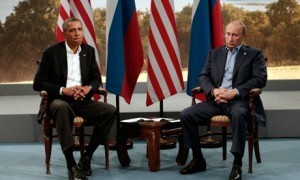 World leaders are increasingly pointing to U.S. President Obama’s failures in the Middle East.
World leaders are increasingly pointing to U.S. President Obama’s failures in the Middle East.
Some are direct and blunt. For example, during his recent visit to Brazil, Russian President Vladimir Putin was asked by journalists about U.S. sanctions against Russia due to the Ukrainian crisis. While naturally condemning such moves, part of his response was to accuse the Obama administration of “encouraging war between neighboring states.” In the same context, Putin added:
American objectives have not been realized, nor have they accomplished anything, because everything has collapsed. Afghanistan faces problems, and Iraq and Libya are falling apart. Egypt also was going to collapse had President Sisi not taken matters in hand. And all this demonstrates the failures of the Obama administration.
In fact, and as I have pointed out in several articles, every Muslim nation the U.S. has interfered in—whether to promote “democracy,” as in the much ballyhooed “Arab Spring,” or to defeat “terrorism” and/or eliminate “WMDs”—has seen two results: the empowerment of Islamists, followed by chaos, conflict, and constant atrocities.
Other leaders, such as Israeli Prime Minister Benjamin Netanyahu, indirectly point to the Obama administration’s failures in the Middle East. This occurred during an interview on NBC’s Meet the Press, in the context of the Presbyterian Church of the USA’s recent decision to divest from Israel in the name of the Palestinian people.
After pointing out that “Christians are persecuted throughout the Middle East”—and nary a word of condemnation or concern from the Presbyterian Church—Netanyahu said:
You know, I would suggest to these Presbyterian organizations to fly to the Middle East, come and see Israel for the embattled democracy that it is, and then take a bus tour, go to Libya, go to Syria, go to Iraq, and see the difference. And I would give them two pieces of advice, one is, make sure it’s an armor-plated bus, and second, don’t say that you’re Christians.
While not directly mentioning the U.S.’s role in these three nations—Netanyahu, after all, is on better terms with America than Putin—the obvious is clear: 1) the U.S. played a major role “liberating” two of these countries—Iraq and Libya—and is currently supporting the freedom fighters/terrorists trying to “liberate” Syria; and 2) in all three nations, the human rights of non-Muslims, specifically Christians, have taken a dramatic nosedive, evincing the nature of those the U.S. helped empower.
Consider Iraq today, one decade after the U.S. took down Saddam Hussein, bringing “freedom” and “democracy” to the Iraqi people: now an Islamic caliphate exists, enforcing the savageries of Sharia—from stoning women accused of adultery to crucifying others, burning churches and forcing Christians either to convert to Islam, pay “taxes” (jizya) and embrace third class status, or face the sword.
Libya, Afghanistan, and rebel-controlled areas of Syria are little better.
As Putin pointed out, the only nation still trying to hang in there is Egypt, thanks to the anti-Muslim Brotherhood revolution—which, of course, was criticized by the U.S. government, including by people like John McCain.
To recap Egypt: the Obama administration turned its back on 30-year-long U.S. ally, the secularist Mubarak, embraced the Islamist Morsi, and some of the worst Muslim persecution of Christians—the litmus test of “radicalization”—took place against the Copts during Morsi’s one year of rule, from an unprecedented attack on the most important Coptic building and seat of the pope, the St. Mark Cathedral, to a dramatic rise in the imprisonment of Christians accused of “insulting” Islam.
As for Egypt’s current president, Sisi, he too made some observations that comport with those of Putin’s (that “someone” is fueling conflict between neighboring states) and Netanyahu’s (that the region is a mess, thanks to the empowerment of Islamists).
During his televised speech in early July, Sisi warned that “religion [code for “Islam”] is being used to destroy neighboring countries”—a clear reference to the empowerment of Islamists in the same failed nations highlighted by Putin and Netanyahu, namely, Iraq, Syria, Libya, and Afghanistan—all the handiwork of U.S. leadership in general, Obama’s administration in particular.
Raymond Ibrahim is a Middle East and Islam specialist and author of Crucified Again: Exposing Islam’s New War on Christians (2013) and The Al Qaeda Reader (2007). His writings have appeared in a variety of media, including the Los Angeles Times, Washington Times, Jane’s Islamic Affairs Analyst, Middle East Quarterly, World Almanac of Islamism, and Chronicle of Higher Education; he has appeared on MSNBC, Fox News, C-SPAN, PBS, Reuters, Al-Jazeera, NPR, Blaze TV, and CBN. Ibrahim regularly speaks publicly, briefs governmental agencies, provides expert testimony for Islam-related lawsuits, and testifies before Congress. He is a Shillman Fellow, David Horowitz Freedom Center; a CBN News contributor; a Media Fellow, Hoover Institution (2013); and a Judith Friedman Rosen Writing Fellow, Middle East Forum . Ibrahim’s dual-background -- born and raised in the U.S. by Coptic Egyptian parents born and raised in the Middle East -- has provided him with unique advantages, from equal fluency in English and Arabic, to an equal understanding of the Western and Middle Eastern mindsets, positioning him to explain the latter to the former.
July 21, 2014
Decimation of Christian population in Iraq worse than Genghis Khan
Iraq Catholic leader says Islamic State worse than Genghis Khan
By Dominic Evans and Raheem Salman (Reuters)
 BAGHDAD (Reuters) – The head of Iraq’s largest church said on Sunday that Islamic State militants who drove Christians out of Mosul were worse than Mongol leader Genghis Khan and his grandson Hulagu who ransacked medieval Baghdad.
BAGHDAD (Reuters) – The head of Iraq’s largest church said on Sunday that Islamic State militants who drove Christians out of Mosul were worse than Mongol leader Genghis Khan and his grandson Hulagu who ransacked medieval Baghdad.
Chaldean Catholic Patriarch Louis Raphael Sako led a wave of condemnation for the Sunni Islamists who demanded Christians either convert, submit to their radical rule and pay a religious levy or face death by the sword.
At the Vatican, Pope Francis decried what he said was the persecution of Christians in the birthplace of their faith, while U.N. Secretary-General Ban Ki-moon said the Islamic State’s actions could constitute a crime against humanity.
Hundreds of Christian families left Mosul ahead of Saturday’s ultimatum, many of them stripped of their possessions as they fled for safety…(continue reading at Yahoo News)
July 18, 2014
History tells us child migrants are not likely diseased, drug smuggling gangs but victims of paranoia
Rumors swirl around migrant kids, fueling local backlash
From Ebola to MS-13, some stoke fears about unaccompanied minors
Liz Goodwin, Yahoo News
…Towns in Texas, Virginia, California, Illinois and other states have put up obstacles in the federal government’s way, saying they don’t want shelters for the children built there. Some of the locals are raising reasonable concerns about the capacity of their town or city to care for the kids and whether allowing them to stay and face trial in the country will encourage more illegal immigration. But other concerns are merely dressed-up conspiracy theories and old-fashioned xenophobia.
Paranoia — especially when it comes to outsiders and foreigners — has a storied history in American politics on both the right and left, and elected officials have been exploiting that to get votes or further their own policy agendas for hundreds of years. (In the 1800s, a sizable group of people believed that allowing Catholics to settle the West along with Protestants would clear the way for the Pope to organize a mass rebellion and slaughter all the heretics, for example.)
These rumors — that the kids carry dangerous diseases, or are secret agents for drug cartels, or will quickly be given citizenship en masse by President Barack Obama — have contributed to hostility against a vulnerable group of young people fleeing violence in their home countries. Earlier this week, an empty Army Reserve warehouse that was being considered for a children’s shelter in Maryland was spray-painted by an anonymous malcontent with the message “NO ILLEAGLES [sic] HERE. NO UNDOCUMENTED DEMOCRATS…” (read full story at Yahoo News)
July 11, 2014
Why ban missionaries from helping migrant children in need?
Feds: Pastors not welcome at immigration camps
By Todd Starnes (Fox News)
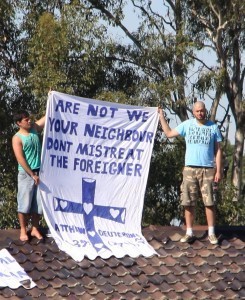 Pastors and churches have been banned from helping the thousands of illegal immigrant children housed in border detention facilities run by U.S. Customs and Border Protection, clergy in Texas and Arizona tell me. “Border Patrol told us pastors and churches are not allowed to visit,” said Kyle Coffin, the pastor of CrossRoads Church in Tucson, Arizona. “It’s pretty heartbreaking that they don’t let anybody in there — even credentialed pastors.” A public affairs officer for the Border Patrol confirmed that ministers and church groups have been banned from the Nogales Placement Center… Pastor Coffin even asked if they could provide the children with toys, blankets and food. But the federal government’s response was the same – no donations allowed. “We just wanted to go down there and have a presence because we care about people,” he said. “That’s all we wanted to do. For the church to be available sends a message that the church cares.” Religious folks in San Antonio had a similar experience. One professional counselor at a camp run by BCFS, an organization previously known as Baptist Child and Family Services, said there were no clergy at all. “The clergy needed to be involved with the children,” my source told me. “The children were very spiritual and their spiritual needs were not being cared for…” (read full story at Fox News)
Pastors and churches have been banned from helping the thousands of illegal immigrant children housed in border detention facilities run by U.S. Customs and Border Protection, clergy in Texas and Arizona tell me. “Border Patrol told us pastors and churches are not allowed to visit,” said Kyle Coffin, the pastor of CrossRoads Church in Tucson, Arizona. “It’s pretty heartbreaking that they don’t let anybody in there — even credentialed pastors.” A public affairs officer for the Border Patrol confirmed that ministers and church groups have been banned from the Nogales Placement Center… Pastor Coffin even asked if they could provide the children with toys, blankets and food. But the federal government’s response was the same – no donations allowed. “We just wanted to go down there and have a presence because we care about people,” he said. “That’s all we wanted to do. For the church to be available sends a message that the church cares.” Religious folks in San Antonio had a similar experience. One professional counselor at a camp run by BCFS, an organization previously known as Baptist Child and Family Services, said there were no clergy at all. “The clergy needed to be involved with the children,” my source told me. “The children were very spiritual and their spiritual needs were not being cared for…” (read full story at Fox News)
July 8, 2014
U.N. seeks refugee status for Central Americans fleeing to U.S.
UN pushes for migrants to be called refugees
By ALBERTO ARCE and MARCOS ALEMAN (AP)
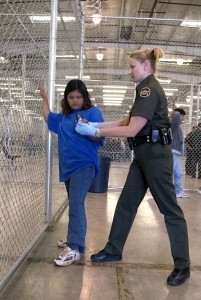 SAN JOSE, Costa Rica (AP) — United Nations officials are pushing for many of the Central Americans fleeing to the U.S. to be treated as refugees displaced by armed conflict, a designation meant to increase pressure on the United States and Mexico to accept tens of thousands of people currently ineligible for asylum.
SAN JOSE, Costa Rica (AP) — United Nations officials are pushing for many of the Central Americans fleeing to the U.S. to be treated as refugees displaced by armed conflict, a designation meant to increase pressure on the United States and Mexico to accept tens of thousands of people currently ineligible for asylum.
Officials with the U.N. High Commissioner for Refugees say they hope to see a regional agreement on that status Thursday when migration and interior department representatives from the U.S., Mexico, and Central America meet in Nicaragua. The group will discuss updating a 30-year-old declaration regarding the obligations nations have to aid refugees.
While such a resolution would lack any legal weight in the United States, the agency said it believes “the U.S. and Mexico should recognize that this is a refugee situation, which implies that they shouldn’t be automatically sent to their home countries but rather receive international protection.”
Most of the people widely considered to be refugees by the international community are fleeing more traditional political or ethnic conflicts like those in Syria or the Sudan…(continue reading at Yahoo News)
July 3, 2014
The link between immigration reform and sex trafficking
Could Christians Opposed to Immigration Reform Be Helping Sex Traffickers?
BY MORGAN LEE , CHRISTIAN POST REPORTER
 Are Christians who do not support immigration reform unwittingly helping human traffickers?
Are Christians who do not support immigration reform unwittingly helping human traffickers?
Maybe so, suggested Jenny Yang, the Vice President of Advocacy and Policy at the Christian advocacy and humanitarian group World Relief, who has spent the past couple years fighting for federal immigration reform.
Are Christians who do not support immigration reform unwittingly helping human traffickers?
Maybe so, suggested Jenny Yang, the Vice President of Advocacy and Policy at the Christian advocacy and humanitarian group World Relief, who has spent the past couple years fighting for federal immigration reform.
“A lot of us evangelicals care about human trafficking, but a lot of us don’t realize how much trafficking is tied to immigration,” Yang told The Christian Post on Tuesday. “I would say that a broken immigration system is a trafficker’s best friend, because traffickers abuse the fact that there’s immigrants here without legal status and they underpay them or they enslave them or they abuse them.”
Yang believes that passing immigration reform legislation will “significantly strengthen protection of victims of trafficking as well as ensuring that traffickers themselves are prosecuted and criminalized.”
“But we won’t see those strengthenings of protections and legal remedies without some kind of immigration reform,” she continued. “Those two things are fundamentally tied together. Ninety percent of trafficking victims are foreign born and the overwhelming majority of trafficking in the United States are immigrants so we have to address both together…”(continue reading at the Christian Post)

